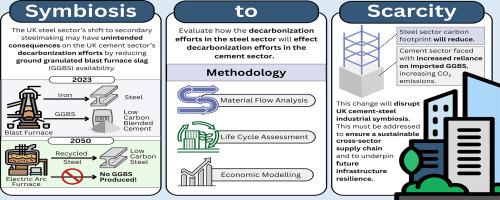From symbiosis to scarcity: evaluating disruption associated with decarbonisation to circular waste materials between the UK cement and steel sectors
IF 10.9
1区 环境科学与生态学
Q1 ENGINEERING, ENVIRONMENTAL
引用次数: 0
Abstract
The UK cement and steel industries are decarbonising rapidly to meet net-zero targets. This study explores the unintended consequences of these efforts, particularly the potential disruption of industrial symbiosis between sectors. Cement production in the UK increasingly relies on ground granulated blast furnace slag (GGBS), a low carbon supplementary cementitious material (SCM). However, the shift from primary to secondary steelmaking threatens domestic GGBS supply. This research uses material flow analysis, life cycle assessment, and economic modelling to evaluate future GGBS availability, carbon intensities, and supply chain vulnerabilities. Findings indicate that although the steel sector is expected to reduce its environmental impact, this will cause the cement sector to face a potential shortfall in domestic SCMs, increasing reliance on imports through cross-sector decoupling and stagnation of decarbonisation. Addressing these challenges is vital to ensure a sustainable cross-sector supply chain and support future UK and global infrastructure resilience.

从共生到稀缺:评估英国水泥和钢铁行业之间与脱碳和循环废物有关的破坏
英国水泥和钢铁行业正在迅速脱碳,以实现净零排放目标。本研究探讨了这些努力的意想不到的后果,特别是部门之间的工业共生的潜在破坏。在英国,水泥生产越来越依赖于磨碎的粒状高炉矿渣(GGBS),一种低碳补充胶凝材料(SCM)。然而,从一级炼钢到二级炼钢的转变威胁到了国内的GGBS供应。本研究使用物料流分析、生命周期评估和经济模型来评估未来GGBS的可用性、碳强度和供应链脆弱性。研究结果表明,尽管钢铁行业有望减少其对环境的影响,但这将导致水泥行业面临国内供应链的潜在短缺,通过跨部门脱钩和脱碳停滞增加对进口的依赖。解决这些挑战对于确保可持续的跨部门供应链和支持未来英国和全球基础设施的弹性至关重要。
本文章由计算机程序翻译,如有差异,请以英文原文为准。
求助全文
约1分钟内获得全文
求助全文
来源期刊

Resources Conservation and Recycling
环境科学-工程:环境
CiteScore
22.90
自引率
6.10%
发文量
625
审稿时长
23 days
期刊介绍:
The journal Resources, Conservation & Recycling welcomes contributions from research, which consider sustainable management and conservation of resources. The journal prioritizes understanding the transformation processes crucial for transitioning toward more sustainable production and consumption systems. It highlights technological, economic, institutional, and policy aspects related to specific resource management practices such as conservation, recycling, and resource substitution, as well as broader strategies like improving resource productivity and restructuring production and consumption patterns.
Contributions may address regional, national, or international scales and can range from individual resources or technologies to entire sectors or systems. Authors are encouraged to explore scientific and methodological issues alongside practical, environmental, and economic implications. However, manuscripts focusing solely on laboratory experiments without discussing their broader implications will not be considered for publication in the journal.
 求助内容:
求助内容: 应助结果提醒方式:
应助结果提醒方式:


